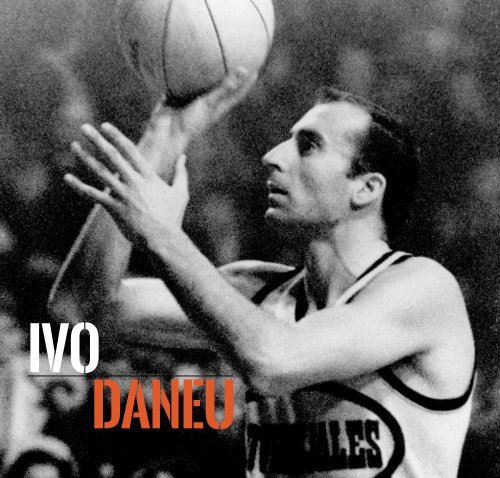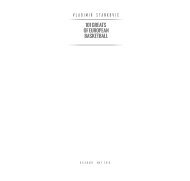IVO DANEU - 101 Greats of European Basketball
You also want an ePaper? Increase the reach of your titles
YUMPU automatically turns print PDFs into web optimized ePapers that Google loves.
Ivo<br />
Daneu<br />
83
The first great<br />
Slovenian<br />
He never won a <strong>European</strong> cup. In fact,<br />
he didn’t even play in any finals. He<br />
didn’t win any other titles since they<br />
didn’t even exist in his playing years.<br />
But believe me, Ivo Daneu was one <strong>of</strong><br />
the greats. Daneu, who was born on<br />
October 6, 1937, in Maribor, was the first Slovenian<br />
basketball superstar. Slovenia is a small country,<br />
with hardly two million people. But it has a long basketball<br />
tradition and many greats played alongside<br />
Daneu and after him. From the generations <strong>of</strong> Bors<br />
Kristancic, Vital Eiselt, Miha Lokar, Marjan Kandus,<br />
Bogdan Miler, Matija Dermastija, Borut Basin and Alosa<br />
Zorga, continuing with Peter Vilfan and Jure Zdovc,<br />
and leading us to modern stars like Rasho Nesterovic,<br />
Primoz Brezec, Erazem Lorbek, Jaka Lakovic, Bostjan<br />
Nachbar, Sasha Vujacic, Goran Dragic and, the latest,<br />
Luka Doncic.<br />
However, before all <strong>of</strong> them was Ivo Daneu, a<br />
1.84-meter guard who <strong>of</strong>fered whatever skill his team<br />
needed. If the team needed points, he scored them. If<br />
his teammates were in need <strong>of</strong> assists, he delivered in<br />
spades. If he had to guard the other team’s best scorer,<br />
there he was. He was one <strong>of</strong> those players who makes<br />
his teammates better, even above their real potential.<br />
In the old Yugoslavia, the name Daneu was quickly<br />
matched with Radivoj Korac. Almost from the same<br />
generation (Korac was born in 1938), they formed the<br />
greatest duo <strong>of</strong> early Yugoslav basketball and they<br />
were key cogs in the rise <strong>of</strong> that country’s basketball<br />
from mediocrity to elite.<br />
In his hometown <strong>of</strong> Maribor, which he had to leave<br />
when his family was thrown out by the Germans, like<br />
many other Slovenians, Daneu’s first love was tennis.<br />
After that, he tried football until, as luck would have it, a<br />
basketball hit him in the face. He was walking out <strong>of</strong> the<br />
stadium and not paying any attention. So he stopped<br />
by the basketball court, picked up the ball and scored.<br />
He never thought <strong>of</strong> any other sport again.<br />
His great talent didn’t go unnoticed at his local Maribor<br />
club, Branik. Several first-division teams wanted to<br />
sign him. Partizan Belgrade <strong>of</strong>fered him “coal and food”<br />
– a common remuneration in those years. But Ljubljana<br />
was closer. He signed for Olimpija in 1956, and the<br />
following year he led the team to its first title! With<br />
Maribor, he was already on the national team, but it was<br />
when he was with Olimpija that he was called – together<br />
with teammates Marjan Kandus, Boris Kristancic, Bogdan<br />
Miler and Matija Dermastija – by coach Aleksandar<br />
Nikolic to be in the 1957 EuroBasket squad in Istanbul.<br />
Yugoslavia finished sixth, and the scoring average <strong>of</strong> a<br />
20-year-old Daneu was 6.5 points. But Nikolic knew he<br />
had a leader for years to come.<br />
Real Madrid wanted him<br />
With Olimpija, Daneu won six Yugoslav League titles<br />
between 1957 and 1970, but there is no reliable statistical<br />
data. He took his team several times to the gates<br />
<strong>of</strong> the <strong>European</strong> final. At the 1967 Final Four in Madrid,<br />
together with Borut Basin (who scored 32 points), he<br />
drove the Real Madrid defense crazy, even though the<br />
Whites won 88-86. Santiago Bernabeu, the Real Madrid<br />
president, gave an order: “Sign this number 10 immediately.”<br />
No. 10 was, <strong>of</strong> course, Daneu. However, it was<br />
<strong>101</strong> greats <strong>of</strong> european basketball<br />
Ivo Daneu<br />
D
Vladimir Stankovic<br />
impossible for him to get out <strong>of</strong> Yugoslavia and even<br />
more difficult to sign for a team from Spain, a country<br />
with whom Yugoslavia didn’t have diplomatic relations.<br />
In the 1963 eighthfinals against Alsace Bagnolet <strong>of</strong><br />
France, Daneu was the unwilling protagonist <strong>of</strong> a scandal.<br />
Daneu was in the military service in Belgrade, and<br />
without him, Olimpija lost 80-61. For the second game,<br />
the club moved heaven and earth to try to get Daneu to<br />
play. Permission arrived at the last minute and he left<br />
in his car at about noon. It was a 635-kilometer drive<br />
to Ljubljana and at that time it took about eight hours<br />
due to bad roads and, especially, the snow. Olimpija<br />
waited for Daneu and delayed the start <strong>of</strong> the game for<br />
almost two hours. The French protested, but the game<br />
didn’t start until news reached the arena that Daneu<br />
was stranded in the middle <strong>of</strong> the snow. Without him,<br />
Olimpija won 128-94. The French team signed an <strong>of</strong>ficial<br />
protest to FIBA, who didn’t even want to hear about it.<br />
What is for sure and from what I saw, on television<br />
or in person – taking into account that I started working<br />
in the spring <strong>of</strong> 1967 – is that Daneu was Olimpija’s best<br />
player by far: a creator, a game director, the soul <strong>of</strong> his<br />
team. Unlike the lack <strong>of</strong> data on his league appearances,<br />
there is a lot <strong>of</strong> information from his national team<br />
years. At the 1959 EuroBasket in S<strong>of</strong>ia, with Korac by<br />
his side, Daneu averaged 8.1 points. In the Rome Olympics<br />
he was up to 9.9 and at the Belgrade EuroBasket,<br />
where Yugoslavia got its first medal, he reached 12.2.<br />
At the 1963 World Cup in Rio, he averaged 11.9 points<br />
with a decisive basket for a win over the United States.<br />
He averaged 13.6 at the Poland EuroBasket after that.<br />
At the Tokyo Olympics he scored 12.1 points and in<br />
1965 EuroBasket in Moscow he had 12.4. He reached<br />
15.0 points at the 1967 World Cup in Montevideo. At<br />
that championship – where his team won a silver medal<br />
– Daneu was chosen MVP <strong>of</strong> the event. When we talk<br />
about his scoring numbers, we must remember that<br />
he was not a natural scorer. He was all about smarts,<br />
game vision, assists and a secure hand for the last<br />
shot. His specialty, like Clifford Luyk, was the hook shot.<br />
He always dribbled to the right corner and, after leaving<br />
his rivals behind, he shot his sky hook from the corner,<br />
parallel to the backboard.<br />
For the 1967 EuroBasket in Helsinki, Yugoslav coach<br />
Ranko Zeravica wanted to inject young blood into the<br />
team and left out some veterans like Daneu and Korac.<br />
But after the failure <strong>of</strong> that team (ninth place), both were<br />
called again for the 1968 Olympics in Mexico. Daneu<br />
responded with brilliant play. His scoring average was<br />
13.9 points, but all the plays started in his hands, all<br />
the possessions were his first. In a dramatic semifinal<br />
against the USSR, with Yugoslavia trailing 58-57, a great<br />
assist from Daneu led to a foul on a young Kresimir<br />
Cosic, who scored both free throws. Petar Skansi, after<br />
a failed attack by the Soviets, increased the lead to 61-<br />
58. Anatoli Povidola scored for the rivals, but then, the<br />
most famous three seconds in Yugoslavian basketball<br />
took place: another pass from Daneu to Vladimir Cvetkovic,<br />
who was fouled. All <strong>of</strong> Yugoslavia stopped in front<br />
<strong>of</strong> the TV screen. Daneu walked up to Cvetkovic and told<br />
him: “Take it easy, you will score both.”<br />
And Cvetkovic did. The final basket, by Sergey Belov<br />
to make it 63-62, was not very useful. In the final, Yugoslavia<br />
lost to the United States, led by Spencer Haywood<br />
(21 points) and Jo Jo White (14), by the final score<br />
65-50. Only Daneu, who scored 16, stood out against<br />
the Americans.<br />
World champion<br />
After winning another silver medal at the 1969 Euro-<br />
84<br />
85
Basket, the 1970 World Cup arrived with the final stage<br />
in Ljubljana. Olimpija had won the league in 1970, but in<br />
the final games two things happened: Daneu suffered a<br />
serious muscle injury in a game against Crvena Zvezda,<br />
and there was a conflict between him and his national<br />
teammate Cvetkovic. Coach Zeravica faced a tough dilemma.<br />
He needed both, but he knew he could only take<br />
one. He chose Daneu because <strong>of</strong> his experience and<br />
the fact that the tourney would be played in Ljubljana in<br />
front <strong>of</strong> his fans. The injured Daneu didn’t play much. He<br />
only played in two games and scored only 8 points. But<br />
in the decisive game against the USA (70-63) he scored<br />
4 important points down the stretch and led Yugoslavia<br />
to its first world title. It was the pinnacle <strong>of</strong> his brilliant<br />
career. In 2010, to celebrate the 40th anniversary <strong>of</strong> that<br />
win, Daneu himself called upon his teammates from the<br />
team that won that historic gold medal to gather once<br />
again. Trajko Rajkovic and Cosic had since passed on.<br />
The rest spent three unforgettable days together.<br />
The record books show Daneu with 202 games<br />
played for the national team and 2,214 points scored<br />
(11.0 ppg.) to make him the seventh-best scorer <strong>of</strong> the<br />
team after Drazen Dalipagic, Dragan Kicanovic, Cosic,<br />
Korac, Drazen Petrovic and Vinko Jelovac. On 32 occasions,<br />
he was the high scorer on the team and he scored<br />
10 or more points in 105 games. He won eight medals<br />
– a World Cup gold, six World and EuroBasket silvers,<br />
and a EuroBasket bronze. In 1967, he was chosen as the<br />
best Yugoslav sportsman. On September 12, 2007, he<br />
was inducted into the FIBA Hall <strong>of</strong> Fame.<br />
And here is one unbelievable piece <strong>of</strong> data by today’s<br />
standards: During the whole length <strong>of</strong> his brilliant<br />
career, Daneu was a working man from 7 a.m. to 3 p.m.,<br />
until he retired. Sometimes he had problems taking<br />
days <strong>of</strong>f so he could play. It was another era, but also<br />
with great players. His son, Jaka, was also an important<br />
player in Olimpija, but not quite at his father’s level. Ivo,<br />
Jaka, and Jaka’s sons were promoters for the 2013 EuroBasket,<br />
which took place in Slovenia, a small country<br />
size-wise, but a great one in terms <strong>of</strong> basketball.<br />
<strong>101</strong> greats <strong>of</strong> european basketball<br />
Ivo Daneu<br />
D

















